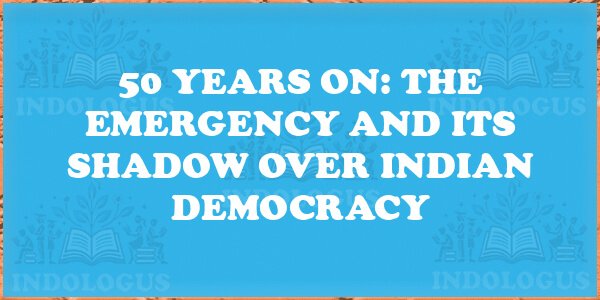The Emergency imposed 50 years ago on June 25, 1975, marked one of the darkest chapters in India’s history. The 21-month period saw the suspension of democratic institutions and fundamental rights, altering the country’s governance.
The Economic Crisis and Social Unrest
- Expenses from the 1971 war strained the treasury.
- Droughts and the 1973 oil crisis impacted the economy.
- Rising inflation, unemployment, and corruption fueled discontent.
Student Movements and Political Opposition
- Navnirman student movement in 1974 sparked opposition.
- Bihar student movement united socialists and right-wing groups.
Jayaprakash Narayan’s Total Revolution
- Narayan called for “sampoorna kranti” against Gandhi’s rule.
- His movement gained momentum nationwide.
Railway Strike and Labor Unrest
- George Fernandes led a railway strike in 1974.
- The strike highlighted the opposition’s power.
Judicial Verdict and Constitutional Crisis
- Allahabad High Court’s judgment triggered the Emergency.
- The verdict threatened Indira Gandhi’s position as PM.
The Night of June 25, 1975
- Gandhi declared the Emergency to subvert the court’s decision.
- The government orchestrated the announcement for control.
Constitutional Subversion and Federal Destruction
- The Emergency altered India’s constitutional framework.
- Centralization of power weakened federalism.
Mass Arrests and Political Repression
- Opposition leaders were imprisoned under draconian laws.
- The government detained over 1.12 lakh people.
Constitutional Amendments and Judicial Emasculation
- Parliament passed amendments consolidating authoritarian power.
- The judiciary’s oversight was curtailed.
Press Censorship and Media Suppression
- Freedom of speech was restricted, and newspapers faced censorship.
- Journalists were jailed for opposing the regime.
Sanjay Gandhi’s Authoritarian Program
- Sanjay Gandhi implemented programs with brutal efficiency.
- Forced sterilizations and slum clearances were carried out.
Electoral Manipulation and Unexpected End
- The government postponed elections and extended its term.
- Gandhi lifted the Emergency in 1977 but faced electoral defeat.
Constitutional Reforms and Long-term Political Consequences
- The Janata government reversed many Emergency changes.
- The Emergency reshaped Indian politics and social dynamics.
Enduring Legacy
- The Emergency ended Congress’ one-party dominance.
- It highlighted the resilience of Indian democracy.
Key Takeaways for Competitive Exams
- The Emergency in India led to the suspension of democratic institutions and fundamental rights.
- Student movements, political opposition, and judicial verdicts triggered the crisis.
- The period saw mass arrests, press censorship, and authoritarian programs.
- Constitutional reforms post-Emergency reshaped Indian politics and governance.
- The Emergency marked a significant shift in Indian democracy, leading to lasting changes and reforms.




